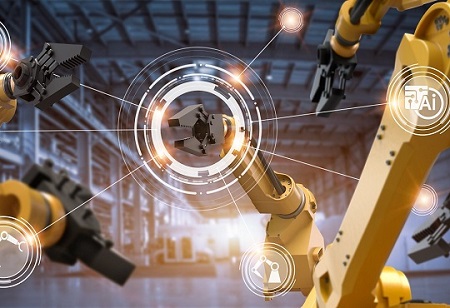
The global AI in manufacturing market is anticipated to reach USD 68.36 billion by 2032, according to a recent research by Precedence Research. AI today is revolutionizing the manufacturing industry by making machines as well as systems to manage tasks that needed the intervention of human intelligence a few years ago. The manufacturing industry is experiencing a significant enhancement in its efficiency and quality control due to the impact of Artificial Intelligence (AI). Artificial intelligence is revolutionizing the methods of production as it possesses the ability to analyze immense quantities of data, make instantaneous judgments, and carry out automated procedures. This is how artificial intelligence enhances productivity and improves quality monitoring within the industry:
AI-powered systems have the capability to analyze the sensor data of different machinery and equipment, enabling them to foresee potential malfunctions and design proactive maintenance strategies. Manufacturers can prevent costly downtime, prolong the lifespan of their equipment, and enhance overall productivity by identifying potential issues in advance.
AI enables the automation of inspection and quality control tasks. Real-time analysis of data from cameras and sensors by machine learning systems enables the identification of issues, deviations, and anomalies. By doing this, it guarantees that the products adhere to rigorous quality criteria, reducing the likelihood of customers receiving damaged goods, and enhancing the overall quality of the products.
NVIDIA (NVDA), a significant participant in various AI fields, provides IGX Orin, an industrial-grade edge AI platform that encompasses solutions for industrial inspection, predictive maintenance, and robotics.
Sudipta Ghosh, Partner and Leader — Data & Analytics, PwC India, said, “As organisations mature in their journey towards using AI for driving business outcomes, a three-pronged approach around identification of appropriate use cases, rigor of measuring and communicating the RoI along with driving adoption and scale at the enterprise level using the framework of responsible and explainable AI will be critical.”
AI algorithms can enhance the effectiveness of industrial processes by utilizing data obtained from production lines, supply chain systems, and inventory management. By identifying patterns, identifying blockages, and pinpointing inefficiencies, AI has the ability to propose enhancements to processes, minimize waste, and enhance operational effectiveness.
"Manufacturing industries in general are hungry for innovation. Manufacturing should be the primary factor for the growth of the Indian economy. The next decade is going to be India's decade of manufacturing. AI can drive efficiency when it comes to reducing costs and increasing efficiency," says Harshit Surekha, Founder & CEO, Robro Systems.
AI-enabled systems have the potential to enhance the operational efficiency of the supply chain through the analysis of data relating to stock levels, patterns in demand, and the performance of suppliers. This contributes to manufacturers being able to make more precise estimations of demand, maintain optimal inventory levels, and enhance their relationships with suppliers. Consequently, this leads to cost savings and faster delivery.
Producers are provided with data-driven insights by AI, assisting them in improving their decision-making. By analyzing extensive amounts of historical and current data, AI algorithms have the ability to assist in production planning, resource allocation, and product development. Manufacturers are able to make informed decisions, minimize risks, and enhance their business strategies through this process.
One such company is Rockwell Automation (ROK) that harnesses the power of artificial intelligence in its "Smart Manufacturing" approach to predict possible issues in the manufacturing process and offer proactive solutions.
Another company is Intel (INTC) that is utilizing artificial intelligence in the manufacturing sector to empower its clients in generating instant data for the purpose of refining workflows.
MicroAI CEO, Yasser Khan, said: “Edge-native AI enables embedded AI software to run on microcontrollers and microprocessors in endpoint devices, transforming how AI can be made available right where data is captured.
AI-powered robots and cobots have the ability to assist humans in efficiently and precisely performing monotonous or physically strenuous tasks. This enhances the safety of workers and allows human workers to focus on more intricate and strategic assignments.
Using AI technology allows manufacturers to obtain a competitive advantage, enhance their efficiency, and improve the quality of their products for customers. With the continuous advancement of AI, manufacturing will be greatly impacted, resulting in considerable enhancements and the emergence of fresh concepts.
Siemens is combining its Teamcenter software for product lifecycle management with Microsoft's OpenAI Service to leverage the potential of generative artificial intelligence (AI). This collaboration aims to enhance innovation and productivity for industrial companies throughout the entire lifecycle of their products, from design and engineering to manufacturing and operation.
Satya Nadella, Chairman and CEO of Microsoft, expressed the immense potential of collaboration, stating: “With this next generation of AI, we have a unique opportunity to accelerate innovation across the entire industrial sector.”
AI is revolutionizing the way digital marketing is conducted in the manufacturing industry. Manufacturers have the ability to enhance their marketing strategies, tailor customer interactions and content plans, streamline their marketing operations, and make data-driven decisions through the utilization of AI. Using AI in digital marketing enables manufacturers to remain competitive, enhance their brand image, and expand their business in the digital era.
We use cookies to ensure you get the best experience on our website. Read more...